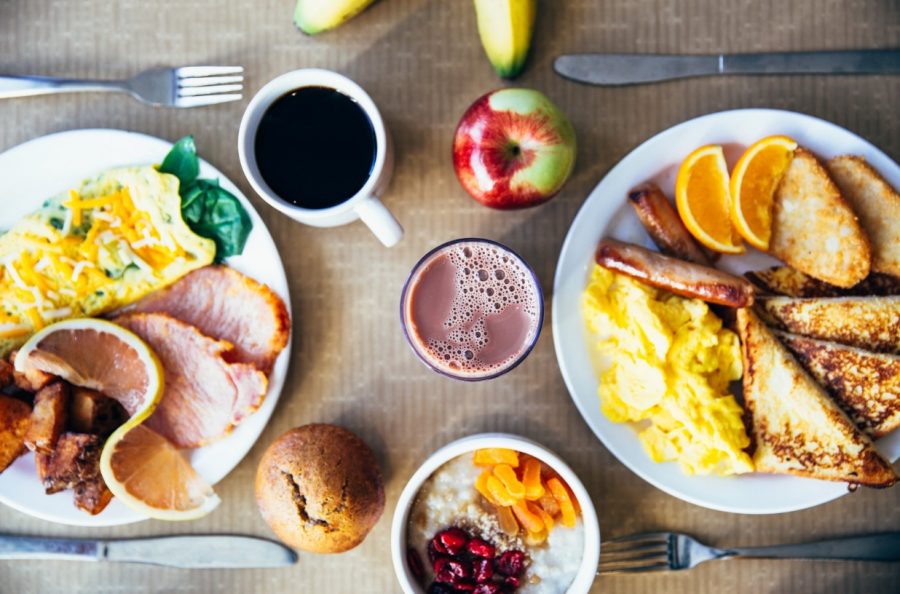Got Breakfast?
Over 66% of students surveyed at Jefferson don’t always eat breakfast. Why is this a problem?
Photo courtesy of burst.shopify.com. Students eat a variety of foods for breakfast. However, they aren’t always healthy, unlike the ones pictured above.
November 4, 2018
Many students have heard their parents, teachers, and counselors tell them that breakfast is the most important meal of the day. However annoying it may be, they’re not wrong. Eating breakfast provides essential nutrients for the brain to function. Without food, students have trouble paying attention and remembering information. Your spatial awareness, the ability to recognize what’s going on around you, is also decreased. Remember, you haven’t eaten for about 10 hours when you wake up!
Some students know of the negative effects mentioned above, but wish to lose weight, and believe that skipping breakfast is the easiest way. However, this doesn’t work. Studies show that people who don’t eat breakfast are actually more likely to become overweight, because they consume more calories later in the day. Skipping any meal results in irritability, stress, and increased hunger. It’s also difficult to think straight when your body is craving food.
Yet at Jefferson, around 36.2% of surveyed students do not eat breakfast every day. That’s over two-thirds of those sampled! Of those, 7.5% of students fell into the ‘never’ category – these students are also often the ones who say that breakfast is not valuable. Still, one student who said that they did eat breakfast said that they also considered it to be of medium low value. 39.33% of students consider breakfast to be of medium value or less – again, over two-thirds.
Eating a healthy breakfast is not as difficult as you may think. If you’re always rushing out the door in the morning, try putting something simple on the counter the night before, whether it is a piece of fruit, like an apple, a muffin, or a protein bar. Though any breakfast is much better than nothing, simply eating something random in the morning isn’t enough to be at your very best.
Over two-fifths of students who responded to the survey question “What do you eat for breakfast?” had cereal in their answer. There’s nothing wrong with cereal – as long as it isn’t the highly sweetened kind. However, many students reach for highly sweetened cereals or sugary pastries, such as donuts and waffles when breakfast time comes. These foods provide energy and some nutrients, but they don’t fill you up. Sugary, processed grains have a high glycemic index, which means that they are digested faster, resulting in an empty stomach long before lunch.
So what should you eat? One of the best food groups to eat from for breakfast is whole grains, but that doesn’t mean you have to eat Raisin Bran. A study by a psychologist from Tufts University found that children who ate whole grain oatmeal instead of Cap’n Crunch performed better during academic activities later on. Why? Whole grains provide fiber, which lowers the glycemic index and helps you feel full longer. They also include essential vitamins, like Vitamin K, that may be difficult to get otherwise. Some examples are whole grain bagels, toast, cereals, and waffles.
You should also eat something with protein, like eggs, peanut butter, cheese, or yogurt. As you may remember from Biology, protein makes up most structures in your body – bones, muscles, skin, and blood. Foods with protein additionally contain vitamins, such as thiamin, riboflavin, niacin, B6, vitamin E, and minerals. Cheese and yogurt are also part of the dairy food group, so they provide calcium – even better! Furthermore, dairy supplies potassium, which maintains blood pressure, and Vitamin D, which helps in the construction of bones.
Try to drink milk, whether it’s whole or skim. Research shows that whole milk is just as healthy, or even healthier, than its skim milk counterpart. If you can’t access milk, a fruit smoothie, which usually has yogurt or milk, is a good alternative. In every meal, fruits and vegetables are always recommended. Try eating some berries with your yogurt, or tomatoes with your eggs. Fruits and vegetables provide essential nutrients such as potassium, dietary fiber, folic acid, vitamin A, and vitamin C.
Above all, remember that breakfast is always essential, whenever and wherever you are. Without breakfast, your academic performance will lack concentration and adequate retention of key facts. You may also feel anxious, annoyed with your friends and life in general, and hungry throughout the day.






